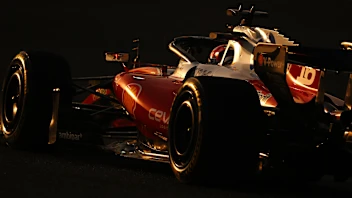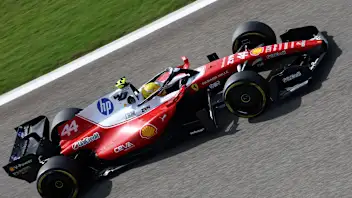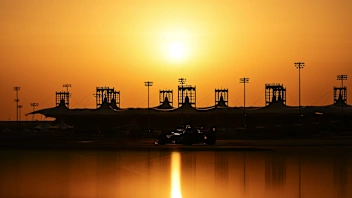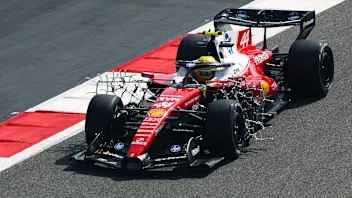FIA Friday press conference - Canada
TEAM REPRESENTATIVES – Dave Greenwood (Marussia), Andrew Green (Force India), Giampaolo Dall'Ara (Sauber), Pat Fry (Ferrari), Paddy Lowe (Mercedes)
Q: Dave can we start with you? Obviously points for the team in Monaco - that must be a huge boost, a huge encouragement to the team. Can you tell us about the reaction within the team and also how you got there, the work that was involved in that?
Dave Greenwood: Yeah, obviously for the whole team they were very pleased on Sunday evening with the result. From the point of view of how we got there, really we'd actually brought some updates to the Barcelona race and we almost struggled a bit to get them working as we'd expected during the race weekend, but the real positive for us was the fact that we had the two-day test after the Barcelona race. So, plenty of new tyres for you to do some good testing and we had quite a good result on the first day. We got the car much better balanced with the parts that we had brought to the race. Certainly Max, on day one, was very happy with the car. Competitiveness-wise on day one? OK, it's only a test and yes we did put the supersoft tyres on, but that vaulted us right up to the front of the timesheets, which was not normal for us. We were quite happy with that and Max did a good job to get the parts working on the first day. Confirmed by Jules, the situation had improved on the second day and we really went into Monaco [where] we kind of thought ‘well, that's great, they worked well at Barcelona, but Monaco is a completely different track'. So we were quite - not nervous, but you know we needed to make sure that the homework we did to translate the set-up from Barcelona to Monaco was the right direction. Monaco free practice went really well, we were really happy with the balance of the car again and the times we were posting. What we're saying is that we were at the back of the midfield pack. I'm not saying we were further forward than that. But that's the place you need to be on a Sunday when you have a race of attrition, which is obviously what we had. It enabled us to be in the right place to take hold of the places when they became available.
Q: Where do you go from here then? Can you repeat that result? How do you build from here and develop?
DG: Obviously on pure pace alone we're not going to repeat that result this weekend. It's clear we needed some luck. But the bottom line is if you're fighting with the cars that are trying to take the eighth, ninth and tenth-place spots, they're good cars, they're good competitors, so you need to have a reasonable amount of pace to be able to stay with them. Obviously in Monaco, you've got the advantage of the fact that there is a huge lap time difference needed to overtake - there's much less here - so that helped us. But we just need to keep progressing, keep bringing developments to the car. We've got some more developments this week, just keep chipping away at it and see how we get on.
Q: Well done, thank you. Giampaolo, coming to you, can you tell us from an engineering point of view why the first six races of the season have gone the way they have for Sauber?
Giampaolo Dall'Ara: Okay. It has been quite a tough beginning, especially entering the season. Even before racing we had quite a tough winter preparing the car and the team with the big changes this year and obviously the big hit we got was that the performance side of things was nowhere near where we were expecting. We have been identifying some of the reasons why. For some of them there was a kind of immediate follow-up but for others it took and is taking longer, that's why we still lag quite a bit behind where we would like to be in terms of pure performance. In the early races we had some reliability issues, some accidents as well, but in all honesty, if you talk about scoring points we were never really in position on performance grounds. In the last of couple of events starting in Barcelona we could introduce a new aero package, we could finalise quite an extensive weight reduction campaign. The car came out for a number of reasons I'm not going to explain here, came out way heavier than we were expecting and targeting so we had to take on that problem as well. On top of this we worked together with our powertrain supplier Ferrari to get on top of some of the issues on that side of things and we believe we made quite a remarkable step and performance. Unfortunately, the kind of race we are able to perform is quite at the back and we would like to step up further, at least to fight in the midfield, regularly scoring points.
We are not quite there yet - but since Barcelona we feel that we are closer. In Barcelona we had to face some set-up issues related to the difference we had in the new package which, let's say, was leading to some instability the drivers couldn't cope with. Not all the issues were solvable and the race was… although we had both cars at the finish line we were quite far from the points. In Monaco, quite a few of those issues were addressed to our satisfaction. Also we had this test in between the two races, which helped a lot and we were reasonably happy about the performance there. We didn't qualify well - not only due to performance, we had a couple of unfortunate rounds so we had to start from the back - but we felt in the race that we could fight which some of the guys we are normally not used to fighting with. Unfortunately we didn't have the cars on the finish line due to accidents in this case which had a high price for us because right now we are, on the sporting side, not in an ideal situation. Definitely we are not happy about this but for sure we don't take it too badly. We feel like we are on a growing pattern and we keep being optimistic about the future. We try to improve race-by-race and we are quite sure that at some point we will be back in the right fight.
Q: Pat, there has been quite a bit of discussion this weekend about the new package on the Ferrari. Fernando said yesterday that there were updates that needed validating here today. Can you tell us what you tried on the car, whether it worked and how you feel about it?
Pat Fry: There were quite a few bits: aero; a lot of the control system tuning; obviously reliability updates in the engine and that in itself allows us to push the engine a little bit harder as well. It's far too early to be able to say whether it's all working or not. Some things are looking promising, some we need to look into in more detail as normal really. So, yeah, reasonable and a broad spread set of developments. But we need to keep developing the car as quickly as we can really.
Q: I guess the big question is: is Mercedes catchable before the end of the season?
PF: I think that's going to be a very tough challenge really - but we just need to keep on. There is quite a gap to close, let's face it, but we just need to do our best and keep developing.
Q: Andy, following on from that, for you, for Force India, are Ferrari catchable? You're 11 points behind them with one third of the season gone.
Andrew Green: I don't think we're really in that sort of position to be targeting Ferrari. I think we're in our own fight with McLaren and Williams for fourth. The sort of teams ahead of us are the big budget teams. We can't really look to compete with those. We'll try to give them a fight wherever we can. If they slip up, we will be right behind them. But to be realistic, I don't think we're really in the same league.
Q: Tell us about today's running. What did you learn about the performance of the tyres in particular on this track - obviously the temperatures today are projected to be lower than what we're expecting for the rest of the weekend.
AG: It's a tricky one for us. It's quite a unique tarmac here in Montreal. It throws up a bit of a conundrum on car set-up. We've always looked to target the best car we can on Sunday afternoon, maybe at the cost of a Saturday afternoon performance. So, we'll be looking at all that data again this evening and making some decisions on which way we go. We've also had our eye on the weather, knowing that it's going to warm up a bit over the next couple of days. So, yeah, we've got some difficult decisions to make over the next few hours.
Q: Paddy, it's a clean sweep so far for you in pole positions and race wins so far this season. It looked like very strong race pace for both cars this afternoon - do you see any areas where the opposition are catching up on you?
Paddy Lowe: We take each race at a time. They're all different circuits with different challenges. This one in particular is very hard on the brakes and difficult to manage the fuel. I think we'll all find that on Sunday. So, yeah, it's not easy. I know we've had a fantastic record so far this year but we have to work very hard, we've got some great competitors out there who will grab everything we leave behind. We've just got to make sure we don't.
Q: You mentioned the braking there. Obviously braking stability is a huge thing around this Montreal circuit and brake-by-wire obviously is a new thing in Formula 1 this year. Could you share any insights with us about setting it up for a place like this and what the key to it all is and how yours is working?
PL: In many ways it makes life easier because the brake-by-wire gives you some authority over brake balance, which we didn't have in the past. So, in that sense, it's taken some difficulties away. I don't think there are any new challenges from that with these new cars.
QUESTIONS FROM THE FLOOR
Q: (Kate Walker - Crash.net) We've heard that there is talk about dropping the Friday morning practice session in light of cost-saving. What kind of impact is that going to have on a technical point of view, other than the time saved on the track?
DG: I think that with all things, initially, you meet these things with some alarm and you think ‘oh my God, how are we going to deal with that?' But the reality is that you start to think about it, you come up with new ways that you're going to structure your programme and I'm sure that ultimately a few races in we will have kind of forgotten about the old way we used to do it and we'll all be used to it and it will just mean a slight re-structuring of the programme and changing the way we do things. But we're all adaptable, that's why we're all in F1 so I'm sure we'll cope.
AG: Well, first of all, from Force India's perspective, we don't see this as cost-saving at all. For us, we've always looked to use the FP1 session to blood in some new drivers and that was an income stream for us and if we lose that, that's going to be a relatively severe blow, which, in turn, will have an impact on our technical ability. So in that respect, I don't think it's cost-saving. I agree, I think we'll get used to it. With just one session, I don't think we'll just move straight into the... we'll move up, we'll condense our programme which was an FP1/FP2 and do it all in one session, so not a big issue.
GD: Yeah, pretty much in line. Obviously from where I sit, I can't judge on the cost-saving side which is out of my area but technically, for a team like ours, the time at the track is very precious. Obviously we are more limited than other teams in simulation as a broad concept so time on track is extremely important for us. Obviously, if this happens, we would have to adapt our plans, try to – as mentioned – try to squeeze what we're doing now in two sessions into one and move off other points, for sure.
PL: I think the rationale is to reduce the workload on the cars significantly through the weekend and also to reduce the consumption of parts, particularly power units, which is one of the major costs for all the teams, but that's a particular burden for the smaller teams. That was the concept. It's still to be finalised, by the way, so there's a whole month in order to determine the small print and to finally approve it, but the concept was to save money. If teams are feeling it isn't going to save money, then of course it could be reviewed.
PF: From a technical point of view, you just have to work out how to deal with it, so you need to do a little bit better homework, you've got one session fewer. Obviously we normally test car bits in one session and test tyres in the other. Now we've got to work out a way of combining the two. Years ago, when we got rid of warm-up and brought in parc ferme, initially hands were up in the air going 'my God, we'll never cope' and now it's great, you can actually sleep on a Saturday night rather than be working forever. So I think you just adapt to it really, so you need to do a little bit better preparation, maybe it leads more into trusting the results from the tunnel, from the simulation and things like that. You just have to adapt.
Q: (Dieter Rencken - Racing Lines) I guess Paddy's the target for this one but if anybody else would like to comment afterwards feel free. Paddy, if we have a look at why there are restrictive regulations limiting the number of power units, transmissions, tyres, running, tests, whatever, head counts are restricted at races, if one looks at it, one comes to the conclusion that ultimately the cost of going racing is roughly or broadly the same, whether you're a Marussia or a Ferrari or a Force India or a Mercedes. Yet if I have a look at Companies House records, a budget for a team like yours and the expenditure over a year is about three times that of Andrew's. That leads me to believe that you're actually spending twice as much on developing your cars, because that's where their shortcomings are, than you are to actually build two cars and go racing for an entire season. Is that really a sustainable business model for the 21st century?
PL: I don't see why it's any less sustainable than it ever has been. Formula 1 has always existed with some differentials between the teams, some teams being better funded than others, and it's always been that way and teams will sustain themselves, they have to manage themselves as businesses to break even at least. They have to be going concerns. If you can generate income then you chose how to spend it and that's the nature of a team. So I don't see any particular difficulty with that, it's always been that way.
AG: I think you've pointed out a very valid fact. I think it's something we're aware of but we go racing on a minimal budget and what we have left over, we try and develop the car with. We can see that other teams have got an incredible amount more money to spend on car development, it's not something we're particularly concerned about. We do what we can with what we've got, that's what we focus on; what everyone else has got is nothing really to do with us.
Q: (Matthew Walthert - Bleacher Report) Pat, yesterday Fernando said of Marco Mattiacci that he has good vision and a very clever approach so now that you've worked with him for almost two months, I'm wondering if you could maybe tell us a little bit about that approach and some changes he's brought in - maybe from your perspective - that are working well?
PF: I think it's good to come with a clean sheet and look at something and see where it works well, where it doesn't work well and sometimes, with some of the engineering things, you do you end up getting so close to it that you miss the obvious things, so I think it's good to come in with a clean set of eyes and see where we need to improve. There are a huge amount of opportunities for us to actually improve the place and we're going through those and then working on how to fix them and improve them.
Q: (Ian Parkes - Press Association) Paddy, when you are in a position like Mercedes with both drivers going head-to-head the way they are for the world title, from a technical point of view, what difficulties have you encountered so far - in particular perhaps reassuring both men that they are getting exactly the same equipment, that the procedures over the weekend are followed to plan, that nothing is unfair effectively?
PL: You're absolutely right, it puts a great pressure on us to more than ever make sure that both drivers are given an absolutely equal opportunity at every level to compete finally in the race, but we manage that. The cars are built identically, each driver has access to the same tools, the same time to develop the car and we just manage it that way. It is a challenge because you find very small, subtle things that you hadn't thought of that can be seen as a difference but we work through those and I think we get a good result.
Next Up
Related Articles
 Leclerc leads Norris on second day of Bahrain testing
Leclerc leads Norris on second day of Bahrain testing Watch as F1 TV breaks down Day 2 of first Bahrain test
Watch as F1 TV breaks down Day 2 of first Bahrain test Who’s driving on Day 3 of the first Bahrain test
Who’s driving on Day 3 of the first Bahrain test What we learned from Day 1 of the first Bahrain test
What we learned from Day 1 of the first Bahrain test Cars hit the track on Day 1 of first Bahrain test
Cars hit the track on Day 1 of first Bahrain test/16x9%20single%20image%20-%202026-02-13T060600.278.webp) LiveLIVE COVERAGE: Day 3 of pre-season testing in Bahrain
LiveLIVE COVERAGE: Day 3 of pre-season testing in Bahrain